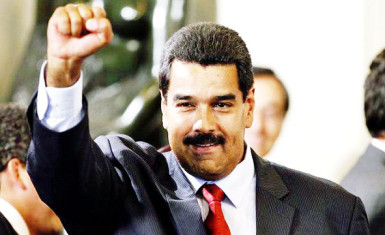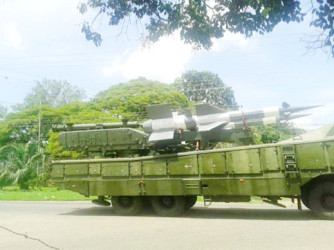Venezuela’s historic pattern of provocation and sabre-rattling in support of its spurious territorial claim against Guyana has manifested itself once again.
On Tuesday September 23 the Government of Guyana announced in a statement that it was concerned about what it described as an “unannounced and unexplained buildup of military forces close to Guyana’s border and waters.
In the wake of Guyana’s protestations, Venezuela’s President Nicolas Maduro, who has been coming under increasing political and economic pressure at home was quick to declare that the troop buildup was part of a military exercise that the country was conducting.

Here in Guyana, however, watchers of trans-border relations would not have been unmindful of the closeness of this incident to the May 26 Decree issued by Maduro claiming sovereignty over Guyana’s territorial waters in the Atlantic Ocean. Analysts, however, have noted the May 26 Decree came closely on the heels of the announcement by Exxon –Mobil regarding the first major oil find in Guyana’s waters.
The ‘noises of war’ reflected in Caracas’ latest show of military force also came a matter of days before Caracas had put on hold the formal accreditation procedures that would have cleared the way for veteran Guyanese diplomat Cheryl Miles to return to Venezuela for her second stint as Guyana’s Ambassador.
Guyana’s President and Commander in Chief of armed forces and retired Guyana Defence Force Brigadier, David Granger remarked that based on his familiarity “with Venezuelan behaviour and what we have noticed during the month of September, the recent troop movements marked an “extraordinary escalation of Venezuelan military activities” in the east of that country.
The buildup of troops close to the border between the two countries occurred just days before the Guyanese President was scheduled to leave the country for the United Nations General Assembly in New York which event will now become a forum of significantly enhanced importance for Guyana. Prior to departing Guyana for New York Granger had said that Caracas’ most recent bout of muscle-flexing “will be central to Guyana’s
representation in the UN General Assembly and to the bilaterals we will be having with Heads of State all around the world,” Granger was quoted as saying before departing for New York.

Ironically, Guyana has, for more than five years, been accessing oil from Venezuela under the so-called Petro-Caribe Agreement reached between Maduro’s successor Hugo Chavez and several Caribbean territories. Venezuela’s latest aggressive posture towards Guyana would appear to have put an end to the deal under which Guyana was shipping up to 200,000 tonnes of rice and paddy to Venezuela at competitive prices.
The recent troop movement on the border and what local officials said was a considerable Venezuelan naval presence in the Cuyuni river is likely to significantly increase the diplomatic work load of Takuba Lodge, the Guyana Ministry of Foreign Affairs as well as the country’s key diplomatic missions in Washington, New York and Brasilia. Observers here say that in circumstances where, by its own admission, the local Foreign Ministry is deficient in human resources, it will also have to address the issue of upping the ante in the matter of sensitising the nation to the threat posed by Venezuela.
Venezuela’s latest bout of military assertiveness will test Guyana’s diplomatic acumen which, while not having been weighed and found wanting in the past is, on this occasion, being tested at a time when the Ministry of Foreign Affairs must compete with other state agencies for scarce resources.





